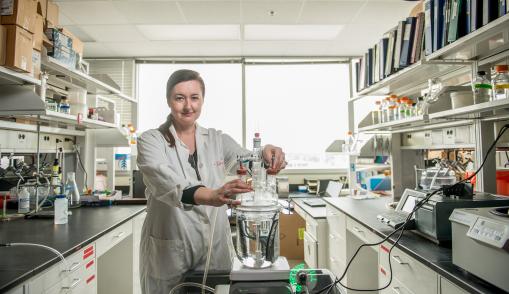
IBM scientists have developed a new lab-on-a-chip technology that can, for the first time, separate biological particles at the nanoscale and could enable physicians to detect diseases such as cancer before symptoms appear.
As reported today in the journal Nature Nanotechnology, the IBM team’s results show size-based separation of bioparticles down to 20 nanometers (nm) in diameter, a scale that gives access to important particles such as DNA, viruses and exosomes. Once separated, these particles can potentially be analyzed by physicians to reveal signs of disease even before patients experience any physical symptoms and when the outcome from treatment is most positive. Until now, the smallest bioparticle that could be separated by size with on-chip technologies was about 50 times or larger, for example, separation of circulating tumor cells from other biological components.
IBM is collaborating with a team from the Icahn School of Medicine at Mount Sinai to continue development of this lab-on-a-chip technology and plans to test it on prostate cancer, the most common cancer in men in the U.S.
In the era of precision medicine, exosomes are increasingly being viewed as useful biomarkers for the diagnosis and prognosis of malignant tumors. Exosomes are released in easily accessible bodily fluids such as blood, saliva or urine. They represent a precious biomedical tool as they can be used in the context of less invasive liquid biopsies to reveal the origin and nature of a cancer.
The IBM team targeted exosomes with their device as existing technologies face challenges for separating and purifying exosomes in liquid biopsies. Exosomes range in size from 20-140nm and contain information about the health of the originating cell that they are shed from. A determination of the size, surface proteins and nucleic acid cargo carried by exosomes can give essential information about the presence and state of developing cancer and other diseases.
exosomes of size 100 nm and larger could be separated from smaller exosomes, and that separation can take place in spite of diffusion, a hallmark of particle dynamics at these small scales. With Mt. Sinai, the team plans to confirm their device is able to pick up exosomes with cancer-specific biomarkers from patient liquid biopsies.
“The ability to sort and enrich biomarkers at the nanoscale in chip-based technologies opens the door to understanding diseases such as cancer as well as viruses like the flu or Zika,” said Gustavo Stolovitzky, Program Director of Translational Systems Biology and Nanobiotechnology at IBM Research. “Our lab-on-a-chip device could offer a simple, noninvasive and affordable option to potentially detect and monitor a disease even at its earliest stages, long before physical symptoms manifest. This extra amount of time allows physicians to make more informed decisions and when the prognosis for treatment options is most positive.”
Learn more: IBM Lab-on-a-Chip Breakthrough Aims to Help Physicians Detect Cancer
The Latest on: IBM Lab-on-a-Chip
[google_news title=”” keyword=”IBM Lab-on-a-Chip” num_posts=”10″ blurb_length=”0″ show_thumb=”left”]
via Google News
The Latest on: IBM Lab-on-a-Chip
- IBM launches new Microsoft copilot capabilities amid AI pushon May 9, 2024 at 5:49 am
IBM Consulting introduces IBM Copilot Runway, including Copilot for Microsoft 365, an AI tool that enhances productivity by generating texts and summarizing emails.
- NATO and quantum computing are part of the cybersecurity agenda for IBM Consultingon May 8, 2024 at 5:50 pm
IBM collaborates with NATO to fortify cybersecurity. Enhancing security visibility management across NATO networks, IBM builds a customized solution.
- After two years, Doug Grose back as NY CREATES board chairon May 6, 2024 at 3:00 pm
Grose stepped down from position to support the America Semiconductor Innovation Coalition, a group poised to jump-start national chip lab perhaps in Albany.
- IBM’s bets on AI and hybrid cloud pay offon May 6, 2024 at 3:00 am
Three key differentiators of IBM’s AI and cloud offerings are cross-platform automation, integration with multiple clouds, and tie-ins to IBM professional services.
- The quantum computing race is onon May 5, 2024 at 6:00 am
Although scientists don’t completely understand the underlying science of quantum mechanics, a global geopolitical, military and commercial race is on for the development of affordable and reliable ...
- IBM invests $137 million in Canadian chip industryon April 30, 2024 at 5:30 am
IBM, the government of Canada and the Quebec government have signed an agreement to expand and strengthen the country’s semiconductor industry to develop the assembly, testing and packaging ...
- IBM Expands AI, Tech Services Unit in Ontario, Canadaon April 30, 2024 at 3:20 am
The blue-chip technology company said Tuesday that the expanded Technology Expert Labs team will be based out of IBM Canada's site in Markham, Ontario where the company has its third largest software ...
- IBM expands team and capabilities in Canada Software Lab to accelerate adoption of Generative AI and other key technologieson April 29, 2024 at 11:00 pm
Deb Pimentel, President, IBM Canada and General Manager, IBM Technology Canada said, "Co-located with our Software Lab in Markham, Technology Expert Labs will provide our clients and partners with ...
- IBM investing $730M to grow Canadian semiconductor manufacturing planton April 28, 2024 at 11:13 am
International Business Machines Corp. will expand its Canadian semiconductor packaging and testing plant with more than C$1 billion ($730 million) in investments over the next five years.
- IBM plots US$730 million expansion of Canadian semiconductor siteon April 26, 2024 at 8:20 am
INTERNATIONAL Business Machines will expand its Canadian semiconductor packaging and testing plant with more than C$1 billion (S$995 million) in investments over the next five years. Read more at The ...
via Bing News










